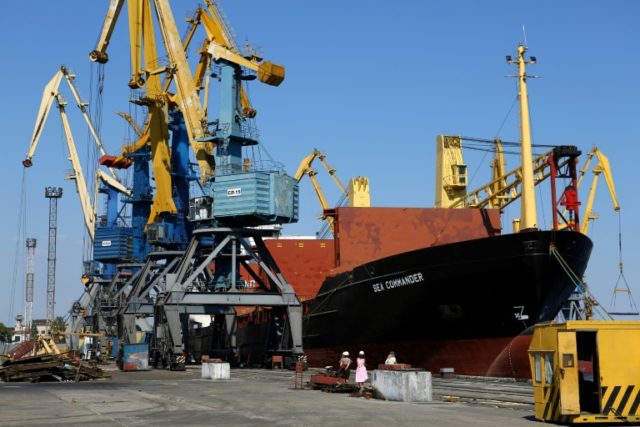Mariupol (Ukraine) (AFP) – Seagulls whirl over the docks of Ukraine’s port of Mariupol on the Sea of Azov as huge cranes once used to unload ships’ cargoes stand idle.
The uncharacteristic quiet is the product of rising tensions in the small sea, the waters of which Russia and Ukraine agreed to share more than a decade ago, but is now the latest theatre in the bitter conflict between the two nations.
Russia’s annexation of the Crimean peninsula from Ukraine in 2014 means ships must now pass through a narrow strait bordered by Russian-controlled territory on both sides, while Kremlin-backed rebel regions of eastern Ukraine are uncomfortably close to Mariupol.
In a growing crisis, Kiev and the West accuse Russia of deliberately blocking ships from entering the sea.
“The whole time I’ve worked here, I’ve never seen anything like it,” said Sergiy Kostyrko, a tanned foreman who has worked at the Mariupol docks for 23 years. “Ships have become very rare visitors to our port.”
Ukraine criticises what it sees as a deliberate move by Moscow to block the Kerch Strait, the only shipping route into the Azov Sea, where Ukraine’s commercial ports of Mariupol and Berdyansk are crucial gateways for its metallurgy industry exports.
– ‘Military operation’ –
Kiev has warned that Russia could even launch an attack on Mariupol.
Russia is trying to block Ukraine’s ports on the Sea of Azov acting “to escalate tensions and, it cannot be ruled out, to carry out a military operation (including) attacks on Mariupol”, Ukraine’s President Petro Poroshenko declared in July.
In a sign of the conflict’s growing scale, the United States has condemned Russia for impeding maritime transit as part of a campaign “to undermine and destabilise Ukraine”.
“We call on Russia to cease its harassment of international shipping in the Sea of Azov,” the US Department of State said in a statement late August.
The European Union’s delegation to Ukraine said earlier this month that Russia “has increasingly and deliberately hindered and delayed the passage of vessels, including vessels from EU member states”.
Foreign ministry spokeswoman Maria Zakharova insisted this week that “Russia’s actions in checking ships are aimed solely at security.”
“It is precisely Kiev’s actions, those of its uncontrollable radicals, that force Russia to strengthen security measures,” she said.
– Five-day checks –
The problems started upon Russia’s completion this spring of a bridge over the Kerch Strait connecting its southern mainland to Crimea.
The link spanning 19 kilometres (12 miles) was one of Moscow’s mega-projects personally endorsed by President Vladimir Putin, who opened it in May at the wheel of a lorry.
The bridge’s 35-metre arches are too low for some ships to pass under and there are also restrictions on length.
In addition, ships heading under the bridge now face lengthy checks by Russian maritime border guards, causing additional financial losses for both ports and shipping companies.
“The check takes three to four hours but waiting for the inspectors takes up to five days,” said Mariupol port director Oleksandr Oliynyk. Previously “the ships would be stopped for maybe 10 hours.”
The result for Ukraine is a significant drop in shipping traffic and subsequent economic losses.
Shipping companies lose between $5,000 and $15,000 with each day of delay for a cargo in the Kerch Strait, Oliynyk said. “At some point, the ship’s owner will say ‘That’s it, I’m not interested’.”
Ukrainian media reported that the ports of Mariupol and Berdyansk saw earnings fall by almost a quarter during the first seven months of this year, compared with the same period last year.
– Risk of military conflict –
So far this is purely a trade conflict, but there is a risk it could escalate into a military standoff between Ukraine and Russia, on top of Kiev’s ongoing four-year war with Kremlin-backed rebels in the east that has claimed more than 10,000 lives.
Mariupol is located just 20 kilometres west of the frontline with Russian-backed separatists.
Russia moved an additional five ships into the Sea of Azov in May, the Jamestown Foundation, a Washington-based research institute, wrote in a report.
Kiev in July claimed Russia had some 40 warships in the Sea of Azov.
This month, following an emergency meeting of Poroshenko’s top brass, Ukraine bolstered its naval force in the Sea of Azov with two gunboats.
The gunboats were deployed “to prevent the illegal stopping of ships by an aggressor country,” deputy infrastructure minister Yuriy Lavrenyuk said.
is-dg-ml-gmo/am/rl

COMMENTS
Please let us know if you're having issues with commenting.